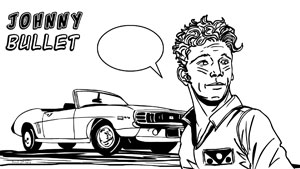

More Comics
Resident Alien: Suicide Blonde #2 Review
By Zak Edwards
October 18, 2013 - 10:19
Studios: $3.99 US
Writer(s): Peter Hogan
Penciller(s): Steve Parkhouse
Cover Artist(s): Steve Parkhouse
As I mentioned last time, Resident Alien: Suicide Blonde is a wonderful read for its quiet approach and use of space to show rather than tell. It operates very differently from Dark Horse’s other output this month, which shows off exactly how narcissism can take over a narrative. Here, writer Peter Hogan lets things play out, gives characters an opportunity to speak for themselves, and, especially important given the story’s mystery premise, allows readers a space to put things together.
For a murder mystery about a pregnant woman who used prostitution as a means to pay for school, the book treads very careful lines between many different hot topics, from the place of sex workers in American society to issues involving male assertion of dominance and female stereotyping. This issue especially, which sees interviews with more than a couple of male characters of questionable character, sets a precedent where readers are expected to think things through is paramount. These male characters all process the death of the woman they think they loved in different ways, but their problematic approach to their relationship with the victim, even as the victim is not romanticized, is a terrible line to try to navigate, but one Hogan does with care. Even in the hands of some of comics’ best writers, the subject matter would end up being a sad assertion of certain approaches almost accidentally, but Suicide Blonde does just the right amount of displacement and faith in readers that the whole story prioritizes thinking through why she died simply over who. That in itself is refreshing, and the approach helps fill out the characters based on the belief that readers are actually reading and not simply consuming.
Artist Steve Parkhouse has that quintessential British zine style, cut on classic British comic institutions that simply works for a few reasons, but speed without stereotyping is one of them. Will Eisner talks about comics relying on visual stereotypes as a way to efficiently tell stories, something that always made me almost queasy. His racial examples did not help, of course, but Parkhouse’s style plays on this in a way that easily incorporates an alien as the protagonist into what is otherwise a noir-ish story. The two main men interrogated this issue, for example, play off visual markers of “nerds” and “jocks,” but combined with Hogan’s character work, they are at once recognizable but more complex than what is initially allowed, like the art helps move the story into complexity rather than make excuses otherwise. That space, between stereotype and the unfamiliar, is what makes this issue work so well, both with its chosen content and stylistic approaches.
Grade: 7.5/10 Thoughtful story with great art. ‘Nuff said.
© Copyright 2002-2026 by Toon Doctor Inc. - All rights Reserved. All other texts, images, characters and trademarks are copyright their respective owners. Use of material in this document (including reproduction, modification, distribution, electronic transmission or republication) without prior written permission is strictly prohibited.
|
|


